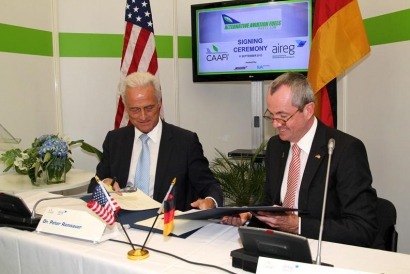
The agreement signed last week will strengthen cooperation between Germany and the US, above all to further develop sustainability standards, gain approval for new production methods and expand the raw materials basis for alternative aviation fuels.
“The aviation industry must also contribute towards energy efficiency and climate protection. This requires close international cooperation, because air transport is a mode of transport that crosses borders and oceans. With the US-German intergovernmental agreement, we aim to make research and development in alternative aviation fuels even more dynamic. This provides us with a good framework within which forward-looking solutions can be discussed,” commented Federal Minister of Transport, Dr. Ramsauer, after signing the agreement with the US Ambassador.
In a press conference that followed, aireg Vice-President Joachim Buse outlined the main elements in the new aireg strategy paper (Fly climate-friendly: Ten percent alternative aviation fuels by 2025): “For aireg, alternative aviation fuels can make a vital contribution towards achieving the goals for carbon dioxide reduction in aviation. The aim of aireg is to see, by the year 2025, a biokerosene blending quota of 10 per cent in the total quantity of aviation fuels used in Germany. To achieve this goal, we must start now to establish the required framework conditions to make this happen.”
Other goals of aireg are to see at least one large, second generation industrial biorefinery to produce bio-synthetic fuels set up in Germany, and to pass government agreements to secure the supply of raw materials. Buse stated further: “We assume that the majority of raw materials required to fulfil our goal of a ten per cent blending quota will come from regions outside of Germany. To make this work, both the raw materials suppliers and processors need reliable framework conditions.”
According to aireg, today, it costs around $2,100 to produce one tonne of biokerosene – more than twice the amount of $925 required to produce a tonne of fossil kerosene. Like the state subsidies for other regenerative energies, aireg therefore demands aids to market introduction and funding instruments such as investment grants for biorefineries or state price guarantees to ensure the biokerosene produced is bought.
For additional information:

